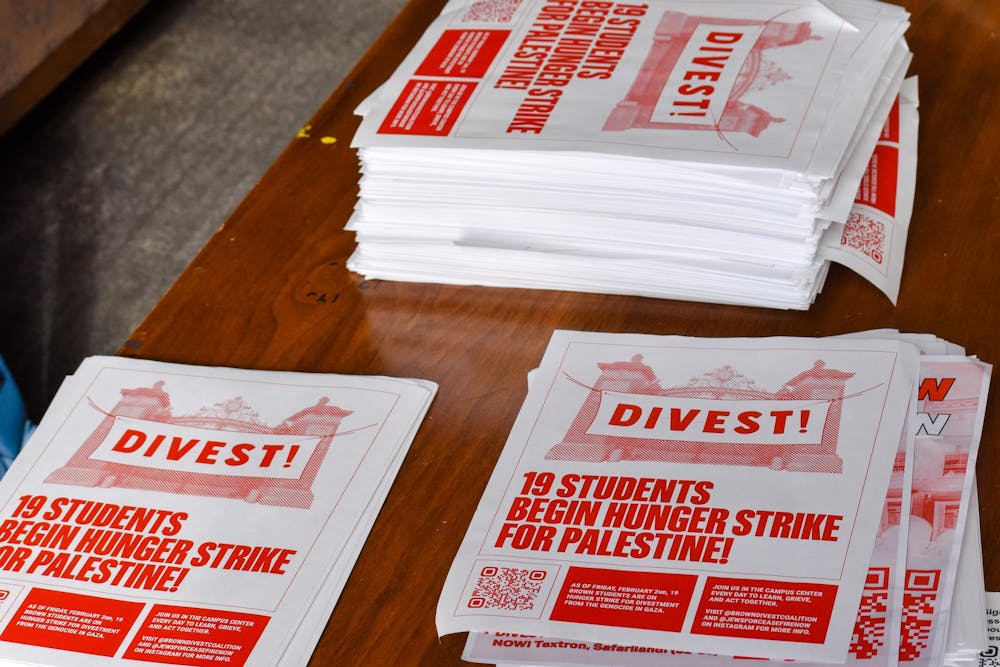Editor’s Note: To help inform The Herald’s ongoing coverage, please fill out this form with your questions about the February hunger strike.
On Monday, 19 student protesters entered the fourth day of their hunger strike despite a letter shared by President Christina Paxson P’19 P’MD’20 wherein she refused to meet their demand that the University’s Corporation “hears and considers a divestment resolution” in its upcoming meetings starting Thursday. Paxson redirected the students to file a proposal via the Advisory Committee on University Resource Management.
Over the weekend, the protesting students shared with The Herald that they would officially continue the strike until their demands were met. They added that they would not file a proposal with ACURM, saying that the time it would take for the committee to consider such a request is “an untenable timeline given the urgency of the crisis in Gaza.”
At noon on Monday, Palestine Solidarity Caucus and Brown Divest Coalition held a second rally on the Main Green. Students, faculty and local political figures — including City Councilor Miguel Sanchez and State Senator Tiara Mack ’16 — attended the fourth-day events. Read additional Herald coverage of the rally here.
During the rally, representatives for the striking students delivered Paxson a 50-page “critical edition” of the 2020 report by the Advisory Committee on Corporate Responsibility in Investment Policies — now known as ACURM. The 2020 ACCRIP report recommended that the Corporation divest “from companies that facilitate the Israeli occupation of Palestinian territory.” In March 2021, Paxson released a letter stating that the ACCRIP recommendation “did not meet established standards” for divestment.
The critical report, authored by the BDC, “responds to President Paxson’s claim that the Brown community is not ready to present its case for divestment to the corporation” and refuses to propose a new resolution to ACURM, according to the document.
The University does not directly invest in “any defense stocks or large munitions manufacturers,” according to University Spokesperson Brian Clark. Large portions of the endowment are invested via third-party managers with portfolios that are confidential, The Herald previously reported.
“We are confident that our external managers have the highest level of ethics and share the values of the Brown community, including the rejection of violence,” Clark wrote in a Feb. 4 email to The Herald.
Hours after the protest, Paxson sent an email letter addressed to University community members entitled “Strengthening our community amid conflict.” In the letter, Paxson wrote that the University community “has experienced tensions and division on campus as a result of the terrible violence in the Middle East” in recent months.
In the letter, Paxson also announced a new website launched Monday. The website, titled “Strengthening Our Community Amid Conflict,” shares details of University initiatives to address “racism, discrimination and harassment,” campus safety and freedom of expression.
Paxson’s email made no reference to the hunger strike or earlier student protests on the conflict — including the Dec. 11 sit-in where all 41 participants were arrested and will face arraignment next week.
Both the website and initiatives mentioned in Paxson’s message were “not a result of the hunger strike,” University Spokesperson Brian Clark wrote in an email to The Herald. The initiatives outlined have been developed “for multiple weeks,” he added.
The initiatives include plans to host workshops, lectures and panel discussions in the coming months regarding Islamophobia, antisemitism, anti-Arab, anti-Israeli and anti-Palestinian experiences on campus. The University also plans to distribute educational resources and augment the campus climate survey to reflect and provide guidance on these issues. In her email, Paxson also emphasized her commitment to safeguarding academic freedom and freedom of speech.
Students participating in the ongoing strike — several of whom come from Palestinian and Jewish backgrounds — shared various reasons for their continued involvement, The Herald previously reported. Strikers highlighted personal upbringings and other aspects of their identities as main motivators in interviews with The Herald.
On Monday, the strikers also held a Quran reading and made protest-related art in the Stephen Robert ’62 Campus Center.
Students affiliated with pro-Palestinian groups have continued to distribute fliers at various locations around campus, including to campus visitors. The most recent fliers include information about the Monday strike and advocate for BDC’s critical report.

Owen Dahlkamp is the managing editor of newsroom on The Herald's 135th Editorial Board, overseeing the paper's news operations. Hailing from San Diego, CA, he is concentrating in Political Science and Cognitive Neuroscience with an interest in data analytics. In his free time, you can find him making spreadsheets at Coffee Exchange.
Samantha was a University News editor overseeing the affinity and activism beat.





